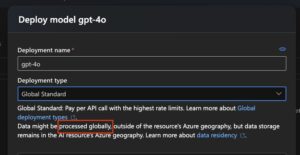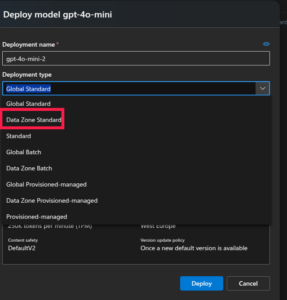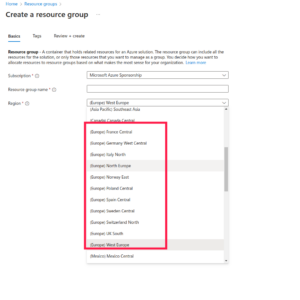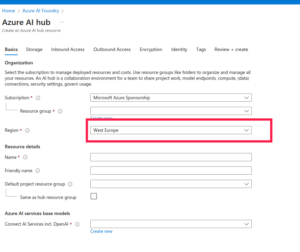Using cloud services like Microsoft Azure often raises questions about data protection, especially when it comes to processing sensitive data within the EU. Here’s an important detail you should be aware of: Even if you choose an EU location for your Azure services, this doesn’t automatically mean that your data will be processed exclusively in the EU.
Why is the Deployment Type “Global Standard” Problematic for Data Protection?

With the “Global Standard” deployment type of Azure OpenAI Services, your data might be processed outside the EU during peak times for load balancing purposes. This usually happens for performance and cost reasons but can be problematic if you’re subject to strict data protection regulations.
What is the “Data Zone Standard” Deployment Type and How Does it Protect Your Data?

Microsoft offers the “Data Zone Standard” deployment type as a solution to this problem. It guarantees that your data will be processed exclusively within the chosen Data Zone (e.g., EUR Zone). Important to note: This option may lead to longer processing times, especially during peak hours.
How Do You Set Up Azure OpenAI in a GDPR-Compliant Way? A Step-by-Step Guide
1. Create a new resource group in Europe (recommended: “West Europe”)

2. Create an AI Hub and a project in “Azure AI Foundry” in the same region

3. Start AI Foundry in your project

4. Deploy a new model

5. Select “Data Zone Standard” as the deployment type

What Are the Advantages and Disadvantages of the “Data Zone Standard” Deployment Type?
The “Data Zone Standard” guarantees you:
- Full GDPR compliance
- Data processing exclusively in the EU
- Better control over data protection
You should consider:
- Potentially longer processing times
- Higher latency during peak hours
The correct configuration of your Azure OpenAI Services is crucial for GDPR compliance. While the “Data Zone Standard” deployment type might not offer the fastest performance, it guarantees compliance with European data protection standards. For your company, especially if you work with sensitive data or are subject to strict data protection guidelines, this option is the only choice.